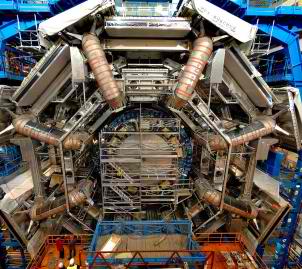People of Light and Darkness

The big news this week is that the Large Hadron Collider, the massive particle accelerator at the European physics lab CERN, has apparently discovered the elusive and long-sought subatomic particle called the Higgs boson, which explains why other particles have mass. The hunt for the Higgs has consumed decades of effort by physicists all over the world, and its discovery fills in one of the last missing pieces of the wildly successful theoretical framework called the Standard Model. Naturally, scientists worldwide are exulting:
Here at the Aspen Center for Physics, a retreat for scientists that will celebrate its 50th birthday on Saturday, the sounds of cheers and popping corks reverberated early Wednesday against the Sawatch Range through the Roaring Fork Valley of the Rockies, as bleary-eyed physicists watched their colleagues read off the results in a webcast from CERN. It was a scene duplicated in Melbourne, Australia, where physicists had gathered for a major conference, as well as in Los Angeles, Chicago, Princeton, New York, London and beyond — everywhere that members of a curious species have dedicated their lives and fortunes to the search for their origins in a dark universe.
…At CERN itself, 1,000 people stood in line all night to get into the auditorium, according to Guido Tonelli, a CERN physicist who said the atmosphere was like a rock concert.
When I look at the massive amounts of human effort and ingenuity invested in finding the Higgs – the enormous and beautiful detectors of the LHC – I’m reminded of the medieval cathedrals that took lifetimes to build, save that the modern cathedrals of science are devoted to advancing the frontiers of humanity’s understanding. This discovery is a moment that people all around the world can and should take pride in. It’s what human beings at our best are capable of.
But meanwhile, while all this was happening, a hard-line Islamist insurgency in the nation of Mali was busying itself smashing centuries-old Sufi mausoleums at a World Heritage site in the city of Timbuktu, an appalling act of cultural vandalism that recalls the Taliban’s destruction of the Buddhas of Bamiyan:
“We are subject to religion and not to international opinion,” said an Ansar Dine spokesman, Oumar Ould Hamaha. “Building on graves is contrary to Islam.”
Sometimes, I find it hard to believe that impulses so noble and so debased could come from the same species. On the one hand, we’re willing to devote billions of dollars and countless hours of intellectual labor in a selfless quest for knowledge, for the pure joy of understanding the cosmos we live in. On the other hand, we have among us minds straight from the dark ages, murderous crusaders for dogma and ignorance who’d happily burn the world down if it meant never having to be exposed to any new or different idea.
The contrast between the two could drive any rational person to despair. While our hands are around each other’s throats – while we squabble over a patch of ground, or how to interpret the words of a long-dead and ignorant ancestor – there’s a universe of wonders awaiting us, if only we would look up and see it. Instead, we tear each other down in pointless mutual destruction, squandering our lives and resources to no benefit, when we could be cooperating and pooling our efforts to discover the even greater things that have yet to be found.
Naive as I know it to be, I can’t help wondering why anyone is still religious. In an era when we’re probing the deepest mysteries of space and time, how can it be that the clergy are still standing behind their dusty pulpits, reciting the laughably primitive dogmas of ancient ages, believing that everything worth knowing was pronounced by seers from many centuries ago? By now, they should have thrown off their vestments in shame and given up their doctrines as utterly inadequate. The churches, mosques and temples should have been made into museums where people can gaze in incredulity at the darkness of our past.
But instead, religion is as strong and dangerous as ever. Granted, there are many nominally religious people who are humanists in all but name: people who practice an enlightened and rational morality, who don’t interpret the fairytales of scripture as literal truth, people whose notion of God is sufficiently amorphous to accommodate any scientific discovery. But there are at least as many people who proudly uphold the banner of ignorance; people whose god is small and ignorant, and who want to keep him that way; people who persecute to the limit of their power to do so, and who’d gladly use force and flame to rid the world of every dissenting viewpoint or crumb of knowledge. It’s no one religion or church that’s responsible for this, but a malignant seed of anti-intellectualism that’s at the heart of every belief system which exalts faith over reason.
I want to believe, and still do believe, that this conflict can be settled peacefully. I hope that as science and reason extend their reach, as our greater understanding improves human life beyond every past imagining, that the attraction of superstition will fade and the belligerent faithful will lay down their arms and join us. But I can’t help fearing that there will instead be a last backlash, a last spasm of annihilatory rage against the coming world, as the conflict between intellectual light and intellectual darkness culminates in a final confrontation. I hope that trial never comes… but if it ever does, I hope even more that we’re ready to face it.
Image: The ATLAS detector of the Large Hadron Collider, via atlas.ch; ATLAS Experiment © 2014 CERN
Daylight Atheism: The Book is now available! Click here for reviews and ordering information.





